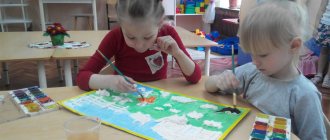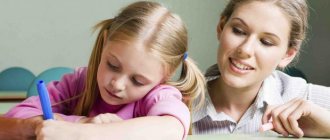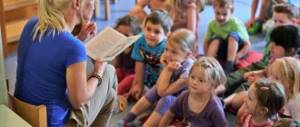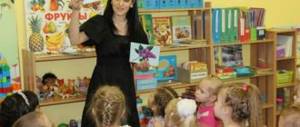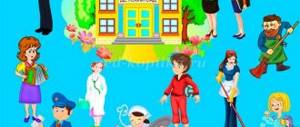The main general educational program of preschool education “From birth to school”, edited by N. E. Veraksa, T. S. Komarova, M. A. Vasilyeva, is an innovative general educational program document for preschool institutions and was developed in accordance with current federal state requirements (FGT, order No. 655 of November 23, 2009).
The leaders of the team of authors are Doctor of Psychology, Professor, Dean of the Faculty of Preschool Pedagogy and Psychology of Moscow State Linguistic University - N. E. Veraksa; Doctor of Pedagogical Sciences, Professor, Honored Scientist of the Russian Federation. Head of the Department of Aesthetic Education, Moscow State University for the Humanities. M. A. Sholokhova - T. S. Komarova.
Authors: A. V. Antonova, Doctor of Pedagogical Sciences; N. A. Arapova-Piskareva: M. M. Borisova, candidate of pedagogical sciences; N. E. Veraksa, Doctor of Psychological Sciences; V. V. Gerbova, candidate of pedagogical sciences; N. F. Gubanova. Candidate of Pedagogical Sciences; N. S. Denisenkova, Candidate of Psychological Sciences: E. M. Dorofeeva, O. V. Dybina, Doctor of Pedagogical Sciences; M. V. Zhigareva, Doctor of Pedagogical Sciences; M. B. Zatsepina, Doctor of Pedagogical Sciences; T. S. Komarova, Doctor of Pedagogical Sciences; G. M. Lyamina, candidate of pedagogical sciences; B.I. Petrova, Doctor of Pedagogical Sciences; S. N. Pidrichnaya, candidate of pedagogical sciences; T. D. Stulnik, candidate of pedagogical sciences; O. A. Solomennikova, candidate of pedagogical sciences; E. Ya. Stepanenkova, candidate of pedagogical sciences; S.N. Teplyuk, candidate of pedagogical sciences.
In the “From Birth to School” Program, the developmental function of education comes to the fore, ensuring the formation of the child’s personality and orienting the teacher to his individual characteristics, which corresponds to modern scientific concepts of preschool education about the recognition of the intrinsic value of the preschool period of childhood.
The program “From birth to school”, edited by N. E. Veraksa, is built on the principles of a humane and personal attitude towards the child and is aimed at his comprehensive development, the formation of spiritual and universal values, as well as abilities and competencies. The Program lacks strict regulation of children's knowledge and subject-centrism in teaching.
When developing the Program, the authors relied on the best traditions of domestic preschool education, its fundamental nature: a comprehensive solution to problems of protecting the lives and strengthening the health of children, comprehensive education, amplification (enrichment) of development based on the organization of various types of children's creative activities. A special role is given to play activity as a leading one in preschool childhood (A. N. Leontyev, A. V. Zaporozhets, D. B. Elkonin, etc.).
The authors of the Program were based on the most important didactic principle - developmental education and the scientific position of L. S. Vygotsky that properly organized training “leads” to development. Education and mental development cannot act as two separate processes independent of each other, but at the same time, “upbringing serves as a necessary and universal form of child development” (V.V. Davydov). Thus, development within the framework of the Program acts as the most important result of the success of the upbringing and education of children.
The Program “From Birth to School,” edited by N. E. Veraksa, comprehensively presents the main content lines of the upbringing and education of a child from birth to school.
The program is based on the principle of cultural conformity. The implementation of this principle ensures that national values and traditions are taken into account in education and makes up for the shortcomings of spiritual, moral and emotional education. Education is considered as a process of introducing a child to the main components of human culture (knowledge, morality, art, work). The main criterion for selecting program material is its educational value, the high artistic level of the cultural works used (classical and folk - both domestic and foreign), the possibility of developing the child’s comprehensive abilities at every stage of preschool childhood.
The leading goals of the “From Birth to School” Program, edited by N. E. Veraksa:
— creating favorable conditions for a child to fully enjoy preschool childhood;
— formation of the foundations of the basic culture of the individual;
— comprehensive development of mental and physical qualities in accordance with age and individual characteristics;
- preparation for life in modern society, for studying at school;
— ensuring the life safety of a preschooler.
These goals are realized in the process of various types of children's activities: play, communication, work, cognitive-research, productive, musical and artistic, reading.
To achieve the goals of the “From Birth to School” Program, edited by N. E. Veraksa, the following are of paramount importance:
• care for the health, emotional well-being and timely comprehensive development of each child;
• creating in groups an atmosphere of humane and friendly attitude towards all students, which allows them to be raised sociable, kind, inquisitive, proactive, striving for independence and creativity;
• maximum use of various types of children's activities, their integration in order to increase the efficiency of the educational process;
• creative organization (creativity) of the educational process;
• variability in the use of educational material, allowing the development of creativity in accordance with the interests and inclinations of each child;
• respect for the results of children's creativity;
• unity of approaches to raising children in a preschool educational institution and family;
• observance of continuity in the work of kindergarten and primary schools, eliminating mental and physical overload in the content of education for preschool children, ensuring the absence of pressure from subject-based learning.
The solution of the goals and objectives of education outlined in the Program “From Birth to School” edited by N. E. Veraksa is possible only with the purposeful influence of the teacher on the child from the first days of his stay in a preschool educational institution. The level of general development that the child will achieve and the degree of strength of the moral qualities he has acquired depend on the pedagogical skill of each educator, his culture, and love for children. Caring for the health and comprehensive education of children, teachers of preschool educational institutions, together with the family, should strive to make every child’s childhood happy.
Contents and structure of the Program “From birth to school” edited by N. E. Veraksa
General educational program of preschool education “FROM BIRTH TO SCHOOL”:
•complies with the principle of developmental education, the goal of which is the development of the child;
•combines the principles of scientific validity and practical applicability (the content of the Program corresponds to the basic principles of developmental psychology and preschool pedagogy and at the same time has the possibility of implementation in mass practice of preschool education);
•meets the criteria of completeness, necessity and sufficiency (allows you to solve set goals and objectives only using necessary and sufficient material, to get as close as possible to a reasonable “minimum”);
•ensures the unity of educational, developmental and training goals and objectives of the education process for preschool children, during the implementation of which knowledge, skills and abilities are formed that are directly related to the development of preschool children;
•is built taking into account the principle of integration of educational areas in accordance with the age capabilities and characteristics of children, the specifics and capabilities of educational areas;
•based on a comprehensive thematic principle of constructing the educational process;
•provides for the solution of program educational tasks in the joint activities of adults and children and the independent activities of preschoolers, not only within the framework of direct educational activities, but also during routine moments in accordance with the specifics of preschool education;
•involves building the educational process on age-appropriate forms of working with children. The main form of work with preschoolers and the leading type of their activity is play.
The program begins with the section “Organization of life and upbringing of children,” which provides general principles for constructing a daily routine, creating a subject-developing educational environment, integrating educational areas and designing the educational process.
The content of psychological and pedagogical work on children’s mastery of the educational areas “Health”, “Physical Education”, “Safety”, “Socialization”, “Labor”, “Cognition”, “Communication”, “Reading Fiction”, “Artistic Creativity”, “ Music" is focused on the diversified development of preschool children, taking into account their age and individual characteristics in the main areas - physical, social-personal, cognitive-speech and artistic-aesthetic. The tasks of psychological and pedagogical work on the formation of physical, intellectual and personal qualities of children are solved integrated in the course of mastering all educational areas along with tasks reflecting the specifics of each educational area, with mandatory psychological support.
The content of psychological and pedagogical work is presented by age groups. The program covers four age periods of physical and mental development of children: early age - from birth to 2 years (first and second groups of early age), junior preschool age - from 2 to 4 years (first and second junior groups), middle preschool age - from 4 to 5 years (middle group), senior preschool age - from 5 to 7 years (senior and pre-school groups).
At the same time, due to the age specificity and developmental characteristics of children from birth to 2 years, the sections for the first and second early age groups are structurally different from the sections for preschool groups.
In the sections on early age groups for each age, characteristics of the age-related characteristics of the mental development of children, features of the organization of children’s lives, an approximate daily routine are given, and the tasks of education and training are defined.
In the sections on preschool groups for each age, in addition to characterizing the age-related characteristics of the mental development of children, the characteristics of the organization of children’s lives, an approximate daily routine and the content of psychological and pedagogical work, approximate comprehensive thematic planning and planned intermediate results of mastering the Program are given.
At the same time, the solution of program educational tasks is provided not only within the framework of direct educational activities, but also during routine moments - both in the joint activities of adults and children, and in the independent activities of preschoolers.
For clarity of presentation, at the beginning of the section for each educational area there is a quote from the FGT (Federal State Requirements), indicating the goals and objectives of this educational area.
The planned intermediate results of mastering the Program in the preparatory group for school coincide with the final results of mastering the Program, therefore they are presented in a separate section that completes the substantive part of the Program.
The section “System for monitoring children’s achievement of the planned results of mastering the Program” sets out the principles of monitoring children’s achievement of the planned intermediate and final results of mastering the Program.
The authors of the Program, recognizing the value of the family as a unique educational institution and the need to develop responsible and fruitful relationships with the families of students, highlight work with parents in a separate section in the Program.
The problem of raising and educating children with disabilities in the general education environment is reflected in the Program in the “Correctional Work” section.
An extensive list of necessary programs, technologies, and teaching aids will help teachers create a basic general education program for their preschool education based on the “FROM BIRTH TO SCHOOL” program and successfully implement it.
Recommendations for writing part of the program formed by participants in the educational process
The program “FROM BIRTH TO SCHOOL” can be used in its entirety without changes as the main general education program of a preschool institution. The scope of the Program is designed to cover 100% of the time allocated to the educational process.
Participants in the educational process can change up to 20% of the total volume of the Program to reflect: 1) the diversity of institutions, the presence of priority areas of activity, including ensuring equal starting opportunities for teaching children in general education institutions, carrying out sanitary and hygienic, preventive and health measures and procedures for the physical, social-personal, cognitive-speech, artistic and aesthetic development of children (except for activities for the qualified correction of deficiencies in the physical and (or) mental development of children with disabilities); 2) the specifics of national-cultural, demographic, climatic conditions in which the educational process is carried out
Continuity
It should be noted that the program “FROM BIRTH TO SCHOOL”, being a modern innovative product, is based on the best traditions of domestic education and in many areas maintains continuity in relation to the most famous preschool education program of the last decade - the “Program of Education and Training in Kindergarten” under Edited by M. A. Vasilyeva, V. V. Gerbova, T. S. Komarova. Thanks to this continuity, most of the manuals for the “Program of Education and Training in Kindergarten” can also be used when working under the program “FROM BIRTH TO SCHOOL”.
Goals and objectives of the “From Birth to School” Program
Ministry of Education and Science of the Samara Region
State budgetary educational institution
Secondary vocational education
Tolyatti Social Pedagogical College
Folder
on educational and industrial practice
PM 03 Organization of classes in basic general education programs of preschool education
Students and interns
Groups
Specialties 050144.52 Preschool education
Head of practice from the institution: Oplachko N.N.
Grade: __________________ / _______________ / _____________
Signature Full name
Tolyatti, 2020
Analysis of an approximate basic general education program for preschool education used in preschool education and the results of its development
Analysis of an approximate basic general education program for preschool education used in preschool education
Compliance with FGT
This program was developed in accordance with the current Federal state requirements for the structure of the basic general education program of preschool education. This is reflected in the following:
· Content of psychological and pedagogical work on children’s mastery of educational areas: “Health”; "Physical Culture"; "Safety"; "Socialization"; "Work"; "Cognition"; "Communication"; “Reading fiction”; "Artistic creativity"; "Music"
· Also, in accordance with FGT, the Program applies the principle of integration of educational areas
· The program “From birth to school” defines the planned results of the program, both final and intermediate
· The program defines the mandatory part of the Program and develops recommendations for writing the part of the Program that is formed by the
participants in the educational process
· The program includes 4 areas of child development: “Physical”, “Social-personal”, “Cognitive-speech”, “artistic-aesthetic”
· The specifics of educational work with children with disabilities are taken into account
· The program combines the principles of scientific validity and practical applicability
· The program is based on a comprehensive thematic principle of constructing the educational process
2. Authors of the program “From birth to school”:
The leaders of the team of authors are Doctor of Psychology, Professor, Dean of the Faculty of Preschool Pedagogy and Psychology of Moscow State Linguistic University - N. E. Veraksa; Doctor of Pedagogical Sciences, Professor, Honored Scientist of the Russian Federation. Head of the Department of Aesthetic Education, Moscow State University for the Humanities. M. A. Sholokhova - T. S. Komarova.
Authors: A. V. Antonova, Doctor of Pedagogical Sciences; N. A. Arapova-Piskareva: M. M. Borisova, candidate of pedagogical sciences; N. E. Veraksa, Doctor of Psychological Sciences; V. V. Gerbova, candidate of pedagogical sciences; N. F. Gubanova, Candidate of Pedagogical Sciences; N. S. Denisenkova, Candidate of Psychological Sciences: E. M. Dorofeeva, O. V. Dybina, Doctor of Pedagogical Sciences; M. V. Zhigareva, Doctor of Pedagogical Sciences; M. B. Zatsepina, Doctor of Pedagogical Sciences; T. S. Komarova, Doctor of Pedagogical Sciences; G. M. Lyamina, candidate of pedagogical sciences; B.I. Petrova, Doctor of Pedagogical Sciences; S. N. Pidrichnaya, candidate of pedagogical sciences; T. D. Stulnik, candidate of pedagogical sciences; O. A. Solomennikova, candidate of pedagogical sciences; E. Ya. Stepanenkova, candidate of pedagogical sciences; S.N. Teplyuk, candidate of pedagogical sciences.
3. Conceptual basis of the program
The Program brings to the fore the developmental function of education, ensuring the formation of the child’s personality and orienting the teacher to his individual characteristics, which corresponds to modern scientific concepts of preschool education about the recognition of the intrinsic value of the preschool period of childhood.
The program is built on the principles of a humane and personal attitude towards the child and is aimed at his comprehensive development, the formation of spiritual and universal values, as well as abilities and competencies. The Program lacks strict regulation of children's knowledge and subject-centrism in teaching.
The Program comprehensively presents all the main content areas of a child’s upbringing and education from birth to school.
The program is based on the principle of cultural conformity. The implementation of this principle ensures that national values and traditions are taken into account in education and makes up for the shortcomings of spiritual, moral and emotional education. Education is considered as a process of introducing a child to the main components of human culture (knowledge, morality, art, work). The main criterion for selecting program material is its educational value, the high artistic level of the cultural works used (classical and folk - both domestic and foreign), the possibility of developing the child’s comprehensive abilities at each stage of preschool childhood.
Goals and objectives of the “From Birth to School” Program
The leading goals of the Program are to create favorable conditions for a child to fully enjoy preschool childhood, form the foundations of basic personal culture, comprehensive development of mental and physical qualities in accordance with age and individual characteristics, prepare for life in modern society, for studying at school, ensuring the safety of life of a preschooler .
These goals are realized in the process of various types of children's activities: play, communication, work, cognitive-research, productive, musical and artistic, reading.
To achieve the goals of the Program, the following are of paramount importance:
• care for the health, emotional well-being and timely comprehensive development of each child;
• creating in groups an atmosphere of humane and friendly attitude towards all students, which allows them to be raised sociable, kind, inquisitive, proactive, striving for independence and creativity;
• maximum use of various types of children's activities, their integration in order to increase the efficiency of the educational process;
• creative organization (creativity) of the educational process;
• variability in the use of educational material, allowing the development of creativity in accordance with the interests and inclinations of each child;
• respect for the results of children's creativity;
• unity of approaches to raising children in a preschool educational institution and family;
• observance of continuity in the work of kindergarten and primary schools, eliminating mental and physical overload in the content of education for preschool children, ensuring the absence of pressure from subject-based learning.
Solving the goals and objectives of education outlined in the Program is possible only with the purposeful influence of the teacher on the child from the first days of his stay in a preschool educational institution. The level of general development that the child will achieve and the degree of strength of the moral qualities he has acquired depend on the pedagogical skill of each educator, his culture, and love for children. Caring for the health and comprehensive education of children, teachers of preschool educational institutions, together with the family, should strive to make every child’s childhood happy.
5.Program structure:
The program begins with the section “Organization of life and upbringing of children,” which provides general principles for constructing a daily routine, creating a subject-developing educational environment, integrating educational areas and designing the educational process.
The content of psychological and pedagogical work on children’s mastery of the educational areas “Health”, “Physical Education”, “Safety”, “Socialization”, “Labor”, “Cognition”, “Communication”, “Reading Fiction”, “Artistic Creativity”, “Music” is focused on the diversified development of preschool children, taking into account their age and individual characteristics in the main areas - physical, social-personal, cognitive-speech and artistic-aesthetic. The tasks of psychological and pedagogical work on the formation of physical, intellectual and personal qualities of children are solved in an integrated manner, in the course of mastering all educational areas, along with tasks reflecting the specifics of each educational area, with mandatory psychological support.
The content of psychological and pedagogical work is presented by age groups. The program covers four age periods of physical and mental development of children: early age - from birth to 2 years (first and second groups of early age), junior preschool age - from 2 to 4 years (first and second junior groups), middle preschool age - from 4 to 5 years (middle group), senior preschool age - from 5 to 7 years (senior and pre-school groups).
At the same time, due to the age specificity and developmental characteristics of children from birth to 2 years, sections for the first and second early age groups are structurally different from the sections for preschool groups.
In the sections on early age groups for each age, characteristics of the age-related characteristics of the mental development of children, features of the organization of children’s lives, an approximate daily routine are given, and the tasks of education and training are defined.
In the sections on preschool groups for each age, in addition to characterizing the age-related characteristics of the mental development of children, the characteristics of the organization of children’s lives, an approximate daily routine and the content of psychological and pedagogical work, approximate comprehensive thematic planning and planned intermediate results of mastering the Program are given.
At the same time, the solution of program educational tasks is provided not only within the framework of direct educational activities, but also during routine moments - both in the joint activities of adults and children, and in the independent activities of preschoolers.
The planned intermediate results of mastering the Program in the preparatory group for school coincide with the final results of mastering the Program, therefore they are presented in a separate section that completes the substantive part of the Program.
In the section “System for monitoring children’s achievement of planned learning outcomes
The authors of the Program, recognizing the value of the family as a unique educational institution and the need to develop responsible and fruitful relationships with the families of students, highlight work with parents in a separate section in the Program.
The problem of raising and educating children with disabilities in the general education environment is reflected in the Program in the “Correctional Work” section.

